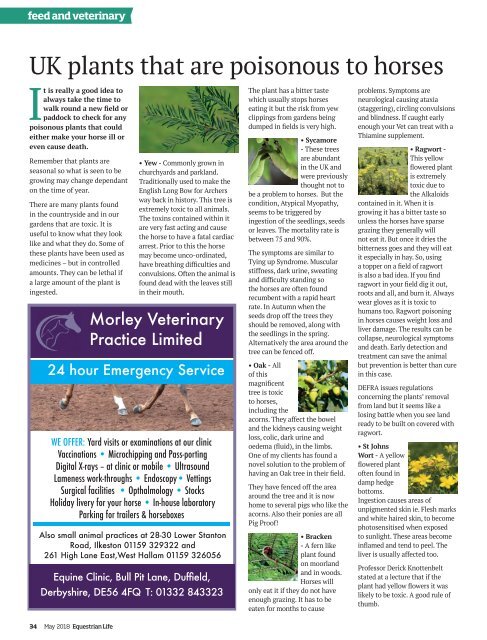Equestrian Life May 2018 Issue
You also want an ePaper? Increase the reach of your titles
YUMPU automatically turns print PDFs into web optimized ePapers that Google loves.
feed and veterinary<br />
UK plants that are poisonous to horses<br />
It is really a good idea to<br />
always take the time to<br />
walk round a new field or<br />
paddock to check for any<br />
poisonous plants that could<br />
either make your horse ill or<br />
even cause death.<br />
Remember that plants are<br />
seasonal so what is seen to be<br />
growing may change dependant<br />
on the time of year.<br />
There are many plants found<br />
in the countryside and in our<br />
gardens that are toxic. It is<br />
useful to know what they look<br />
like and what they do. Some of<br />
these plants have been used as<br />
medicines – but in controlled<br />
amounts. They can be lethal if<br />
a large amount of the plant is<br />
ingested.<br />
• Yew - Commonly grown in<br />
churchyards and parkland.<br />
Traditionally used to make the<br />
English Long Bow for Archers<br />
way back in history. This tree is<br />
extremely toxic to all animals.<br />
The toxins contained within it<br />
are very fast acting and cause<br />
the horse to have a fatal cardiac<br />
arrest. Prior to this the horse<br />
may become unco-ordinated,<br />
have breathing difficulties and<br />
convulsions. Often the animal is<br />
found dead with the leaves still<br />
in their mouth.<br />
Morley Veterinary<br />
Practice Limited<br />
24 hour Emergency Service<br />
WE OFFER: Yard visits or examinations at our clinic<br />
Vaccinations • Microchipping and Pass-porting<br />
Digital X-rays – at clinic or mobile • Ultrasound<br />
Lameness work-throughs • Endoscopy• Vettings<br />
Surgical facilities • Opthalmology • Stocks<br />
Holiday livery for your horse • In-house laboratory<br />
Parking for trailers & horseboxes<br />
Also small animal practices at 28-30 Lower Stanton<br />
Road, Ilkeston 01159 329322 and<br />
261 High Lane East,West Hallam 01159 326056<br />
Equine Clinic, Bull Pit Lane, Duffield,<br />
Derbyshire, DE56 4FQ T: 01332 843323<br />
The plant has a bitter taste<br />
which usually stops horses<br />
eating it but the risk from yew<br />
clippings from gardens being<br />
dumped in fields is very high.<br />
• Sycamore<br />
- These trees<br />
are abundant<br />
in the UK and<br />
were previously<br />
thought not to<br />
be a problem to horses. But the<br />
condition, Atypical Myopathy,<br />
seems to be triggered by<br />
ingestion of the seedlings, seeds<br />
or leaves. The mortality rate is<br />
between 75 and 90%.<br />
The symptoms are similar to<br />
Tying up Syndrome. Muscular<br />
stiffness, dark urine, sweating<br />
and difficulty standing so<br />
the horses are often found<br />
recumbent with a rapid heart<br />
rate. In Autumn when the<br />
seeds drop off the trees they<br />
should be removed, along with<br />
the seedlings in the spring.<br />
Alternatively the area around the<br />
tree can be fenced off.<br />
• Oak - All<br />
of this<br />
magnificent<br />
tree is toxic<br />
to horses,<br />
including the<br />
acorns. They affect the bowel<br />
and the kidneys causing weight<br />
loss, colic, dark urine and<br />
oedema (fluid), in the limbs.<br />
One of my clients has found a<br />
novel solution to the problem of<br />
having an Oak tree in their field.<br />
They have fenced off the area<br />
around the tree and it is now<br />
home to several pigs who like the<br />
acorns. Also their ponies are all<br />
Pig Proof!<br />
• Bracken<br />
- A fern like<br />
plant found<br />
on moorland<br />
and in woods.<br />
Horses will<br />
only eat it if they do not have<br />
enough grazing. It has to be<br />
eaten for months to cause<br />
problems. Symptoms are<br />
neurological causing ataxia<br />
(staggering), circling convulsions<br />
and blindness. If caught early<br />
enough your Vet can treat with a<br />
Thiamine supplement.<br />
• Ragwort -<br />
This yellow<br />
flowered plant<br />
is extremely<br />
toxic due to<br />
the Alkaloids<br />
contained in it. When it is<br />
growing it has a bitter taste so<br />
unless the horses have sparse<br />
grazing they generally will<br />
not eat it. But once it dries the<br />
bitterness goes and they will eat<br />
it especially in hay. So, using<br />
a topper on a field of ragwort<br />
is also a bad idea. If you find<br />
ragwort in your field dig it out,<br />
roots and all, and burn it. Always<br />
wear gloves as it is toxic to<br />
humans too. Ragwort poisoning<br />
in horses causes weight loss and<br />
liver damage. The results can be<br />
collapse, neurological symptoms<br />
and death. Early detection and<br />
treatment can save the animal<br />
but prevention is better than cure<br />
in this case.<br />
DEFRA issues regulations<br />
concerning the plants’ removal<br />
from land but it seems like a<br />
losing battle when you see land<br />
ready to be built on covered with<br />
ragwort.<br />
• St Johns<br />
Wort - A yellow<br />
flowered plant<br />
often found in<br />
damp hedge<br />
bottoms.<br />
Ingestion causes areas of<br />
unpigmented skin ie. Flesh marks<br />
and white haired skin, to become<br />
photosensitised when exposed<br />
to sunlight. These areas become<br />
inflamed and tend to peel. The<br />
liver is usually affected too.<br />
Professor Derick Knottenbelt<br />
stated at a lecture that if the<br />
plant had yellow flowers it was<br />
likely to be toxic. A good rule of<br />
thumb.<br />
34 <strong>May</strong> <strong>2018</strong> <strong>Equestrian</strong> <strong>Life</strong>
















